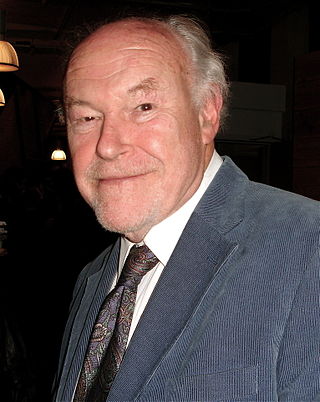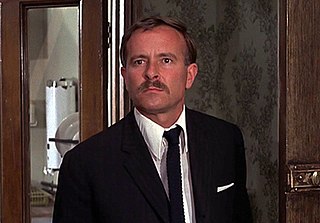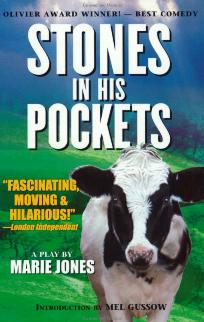A screenplay, or script, is a written work produced for a film, television show, or video game by screenwriters. A screenplay written for television is also known as a teleplay. Screenplays can be original works or adaptations from existing pieces of writing. A screenplay is a form of narration in which the movements, actions, expressions and dialogue of the characters are described in a certain format. Visual or cinematographic cues may be given, as well as scene descriptions and scene changes.

Timothy Lancaster West, CBE is an English actor and presenter. He has appeared frequently on stage and television, including stints in both Coronation Street and EastEnders, and Not Going Out, as the original Geoffrey Adams. He is married to the actress Prunella Scales; from 2014 to 2019, they travelled together on UK and overseas canals in the Channel 4 series Great Canal Journeys.

Stage management is a broad field that is generally defined as the practice of organization and coordination of an event or theatrical production. Stage management may encompass a variety of activities including overseeing of the rehearsal process and coordinating communications among various production teams and personnel. Stage management requires a general understanding of all aspects of production and provides complete organization to ensure the process runs smoothly and efficiently.
Visual effects is the process by which imagery is created or manipulated outside the context of a live-action shot in filmmaking and video production. The integration of live-action footage and other live-action footage or CGI elements to create realistic imagery is called VFX.
Pre-production is the process of planning some of the elements involved in a film, television show, play, or other performance, as distinct from production and post-production. Pre-production ends when the planning ends and the content starts being produced.
Filmmaking or film production is the process by which a motion picture is produced. Filmmaking involves a number of complex and discrete stages, beginning with an initial story, idea, or commission. Production then continues through screenwriting, casting, pre-production, shooting, sound recording, post-production, and screening the finished product before an audience, which may result in a film release and exhibition. The process is nonlinear, as the director typically shoots the script out of sequence, repeats shots as needed, and puts them together through editing later. Filmmaking occurs in a variety of economic, social, and political contexts around the world, and uses a variety of technologies and cinematic techniques to make theatrical films, episodic films for television and streaming platforms, music videos, and promotional and educational films.

Alexander Duncan McCowen, was an English actor. He was known for his work in numerous film and stage productions.

In the performing arts industry such as theatre, film, or television, casting, or a casting call, is a pre-production process for selecting a certain type of actor, dancer, singer, or extra for a particular role or part in a script, screenplay, or teleplay. This process may be used for a motion picture, television program, documentary film, music video, play, or advertisement, intended for an audience.

A mimeartist, or simply mime, is a person who uses mime, the acting out of a story through body motions without the use of speech, as a theatrical medium or as a performance art. In earlier times, in English, such a performer would typically be referred to as a mummer. Miming is distinguished from silent comedy, in which the artist is a character in a film or skit without sound.
Declan Michael Martin Donnellan is an English film/stage director and author. He co-founded the Cheek by Jowl theatre company with Nick Ormerod in 1981. In addition to his Cheek by Jowl productions, Donnellan has made theatre, opera and ballet with a variety of companies across the world. In 1992, he received an honorary degree from the University of Warwick and in 2004 he was made a Chevalier de l'Ordre des Arts et des Lettres for his work in France. In 2010, he was made an honorary fellow of Goldsmiths' College, University of London. Donnellan was appointed Officer of the Order of the British Empire (OBE) in the 2017 Birthday Honours for services to theatre.
A dialect coach is a technical advisor who supports actors as they craft voice and speech patterns for characters in the context of productions be it in an on-camera setting, stage setting, or voiceover setting.

World and Time Enough is a 1994 independent gay-themed romantic comedy-drama written and directed by Eric Mueller and starring Gregory Giles, Matt Guidry, and Kraig Swartz.
Abhijat Joshi is an Indian screenwriter, film director, producer and editor who works in Hindi cinema. His is known for collaboration with Vinod Chopra Productions and director Rajkumar Hirani, as the screenwriter for Lage Raho Munna Bhai (2006), 3 Idiots (2009), PK (2014) and Sanju (2018). He is a professor of English at Otterbein University in Westerville, Ohio, since 2003.

Stones in His Pockets is a two-hander written in 1996 by Marie Jones for the DubbleJoint Theatre Company in Dublin, Ireland.
Maxwell Robert Guthrie Stewart "Max" Stafford-Clark is a British theatre director.

Christopher Thomas Morahan CBE was a British stage and television director and production executive.
Stephen Unwin is an English theatre director. Unwin read English at Downing College, Cambridge, where he directed many student productions, including an award-winning production of Measure for Measure that transferred to the Almeida, where he was awarded an Arts Council Trainee Director’s Bursary. He has since directed over 50 professional productions and 12 operas. For much of the 1980s, he was Associate Director at the Traverse Theatre, Edinburgh, and several of his productions transferred to London theatres. He worked with a wide range of leading actors, including Simon Russell Beale, Tilda Swinton, Ken Stott, and dozens of others. In the early 1990s, he became Resident Director at the National Theatre Studio.

An actor or actress is a person who portrays a character in a production. The actor performs "in the flesh" in the traditional medium of the theatre or in modern media such as film, radio, and television. The analogous Greek term is ὑποκριτής (hupokritḗs), literally "one who answers". The actor's interpretation of a role—the art of acting—pertains to the role played, whether based on a real person or fictional character. This can also be considered an "actor's role", which was called this due to scrolls being used in the theaters. Interpretation occurs even when the actor is "playing themselves", as in some forms of experimental performance art.
Burton Field Brinckerhoff is an American actor, director, and producer. He was nominated for a Tony Award for his role as Igor in the play Cactus Flower (1965–1968), a Daytime Emmy Award for directing an episode of the television series The ABC Afternoon Playbreak (1973), and three Primetime Emmy Awards for directing episodes of the television series Lou Grant (1978–1982).
The Dungog Film Festival was an annual event held in the Hunter Region town of Dungog. The Dungog Film Festival was a not-for-profit arts organization that was dedicated to celebrating and promoting the Australian screen industry. The festival provided education of the Australian film and TV industry through a range of initiatives. Some proceeds of the festival have gone towards preserving the James Theatre. The festival aimed to support the Australian Film and TV Industry in a non-competitive environment that exclusively showcased Australian screen content.









